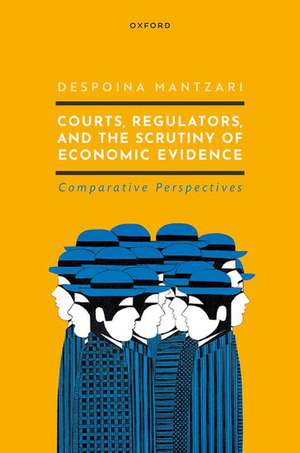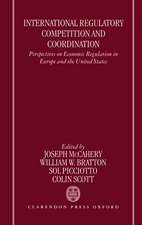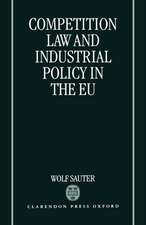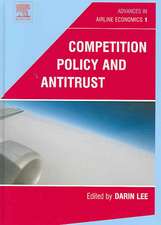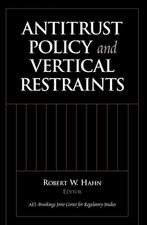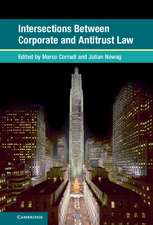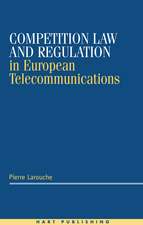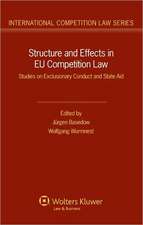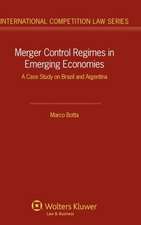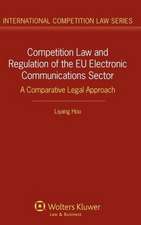Courts, Regulators, and the Scrutiny of Economic Evidence
Autor Despoina Mantzarien Limba Engleză Hardback – 16 sep 2022
Preț: 557.01 lei
Preț vechi: 655.31 lei
-15% Nou
Puncte Express: 836
Preț estimativ în valută:
106.60€ • 115.75$ • 89.54£
106.60€ • 115.75$ • 89.54£
Carte disponibilă
Livrare economică 01-15 aprilie
Livrare express 15-21 martie pentru 32.09 lei
Preluare comenzi: 021 569.72.76
Specificații
ISBN-13: 9780198851608
ISBN-10: 019885160X
Pagini: 272
Dimensiuni: 162 x 240 x 20 mm
Greutate: 0.54 kg
Editura: OUP OXFORD
Colecția OUP Oxford
Locul publicării:Oxford, United Kingdom
ISBN-10: 019885160X
Pagini: 272
Dimensiuni: 162 x 240 x 20 mm
Greutate: 0.54 kg
Editura: OUP OXFORD
Colecția OUP Oxford
Locul publicării:Oxford, United Kingdom
Recenzii
Effective judicial review is necessary to ensure the legitimacy of modern systems of administrative law enforcement. In view of the increased complexity of cases brought before them, Courts have no choice but to truly engage with economic and scientific evidence, while ensuring the expediency of proceedings. The book of Prof Mantzari, one of the rising stars in the field, is a must read for anyone interested in the role of Courts. Very well researched, inter disciplinary and comparative: in short, an outstanding piece of modern legal scholarship.
Informatively enhanced for the reader with the inclusion of Figures, Tables, Cases, Legislation, a ten page Bibliography, and a ten page Index, "Courts, Regulators, and the Scrutiny of Economic Evidence" is an especially well written, organized and presented study that is unreservedly recommended for professional, governmental, college, and university library Economics collections and supplemental curriculum studies syllabus.
This work offers a new and highly effective approach to the study of regulatory practice, particularly by different institutional models, on the use and critical examination of economic evidence. In favouring the methods and practices of the UK's Competition Appeal Tribunal, (the 'CAT') it makes a judgment with which it is very hard to disagree. But the book is valuable as much for the comprehensive coverage of two decades' practice as for the conclusions it reaches. The author is to be congratulated for this timely contribution to the study of regulation.
This book sheds much needed light on how courts engage - or should engage - with economic evidence in regulatory disputes and is a must-read for anyone interested in judicial review and economic evidence in the realm of regulation and beyond. The author's analysis is theoretically solid, methodologically rich and rigorous, and exceptionally insightful and thought-provoking
Mantzari provides a fascinating account of legal and social science theories relating to how the choice of institutions affects the substance of the law (...) The book is rich in theory and detail. The selection of methods and the normative arguments engage deeply with various strands of scholarship ranging from the theories and history of regulation, to the philosophy of judicial review and comparative institutional analysis. Such debates are presented clearly and informatively, friendly also to those who are not fully immersed in those discussions (...) The book makes notable contributions beyond its immediate research questions and would be of great interest to the study of the institutional development of regulatory authorities and their governance.
It deals with an increasingly complex and important area of procedural law, namely the handling of economic evidence by courts and tribunals in - amongst other areas - competition law. In addition to providing really helpful information as regards practice and procedure in many tribunals across the world, the book provides a helpful framework for considering the important questions that arise, and useful pointers as to how such questions might be resolved. It is - for the practitioner, as well as the academic - a key text.
Mantzari's book is an impressive display of interdisciplinary legal research. The author should be commended for skillfully combining insights from philosophy, economics, and political theory with legal analysis. Indeed, the book achieves more than what it advertises. Even though Mantzari only looks at UK and US law, her arguments can be extended to EU law as well. Similarly, although she deals with utilities regulation, readers of competition or public procurement law will find much relevant information within the book's pages.
Informatively enhanced for the reader with the inclusion of Figures, Tables, Cases, Legislation, a ten page Bibliography, and a ten page Index, "Courts, Regulators, and the Scrutiny of Economic Evidence" is an especially well written, organized and presented study that is unreservedly recommended for professional, governmental, college, and university library Economics collections and supplemental curriculum studies syllabus.
This work offers a new and highly effective approach to the study of regulatory practice, particularly by different institutional models, on the use and critical examination of economic evidence. In favouring the methods and practices of the UK's Competition Appeal Tribunal, (the 'CAT') it makes a judgment with which it is very hard to disagree. But the book is valuable as much for the comprehensive coverage of two decades' practice as for the conclusions it reaches. The author is to be congratulated for this timely contribution to the study of regulation.
This book sheds much needed light on how courts engage - or should engage - with economic evidence in regulatory disputes and is a must-read for anyone interested in judicial review and economic evidence in the realm of regulation and beyond. The author's analysis is theoretically solid, methodologically rich and rigorous, and exceptionally insightful and thought-provoking
Mantzari provides a fascinating account of legal and social science theories relating to how the choice of institutions affects the substance of the law (...) The book is rich in theory and detail. The selection of methods and the normative arguments engage deeply with various strands of scholarship ranging from the theories and history of regulation, to the philosophy of judicial review and comparative institutional analysis. Such debates are presented clearly and informatively, friendly also to those who are not fully immersed in those discussions (...) The book makes notable contributions beyond its immediate research questions and would be of great interest to the study of the institutional development of regulatory authorities and their governance.
It deals with an increasingly complex and important area of procedural law, namely the handling of economic evidence by courts and tribunals in - amongst other areas - competition law. In addition to providing really helpful information as regards practice and procedure in many tribunals across the world, the book provides a helpful framework for considering the important questions that arise, and useful pointers as to how such questions might be resolved. It is - for the practitioner, as well as the academic - a key text.
Mantzari's book is an impressive display of interdisciplinary legal research. The author should be commended for skillfully combining insights from philosophy, economics, and political theory with legal analysis. Indeed, the book achieves more than what it advertises. Even though Mantzari only looks at UK and US law, her arguments can be extended to EU law as well. Similarly, although she deals with utilities regulation, readers of competition or public procurement law will find much relevant information within the book's pages.
Notă biografică
Dr Despoina Mantzari is Associate Professor in Competition Law and Policy at University College London (UCL), Faculty of Laws. Prior to that she was a lecturer at the University of Reading and a postdoctoral research fellow at the Centre for Competition Policy at the University of East Anglia. She was also a visiting researcher at the UC Berkeley Boalt Hall School of Law and a Fellow at the Institute of Advanced Legal Studies in London. She holds a PhD and an LL.M from UCL and studied law at the National University of Athens. Her research cuts across competition law and public law and regulation and has been funded by the AHRC, the ESRC, and the BA/Leverhulme Trust.
